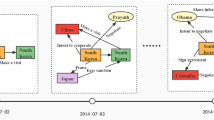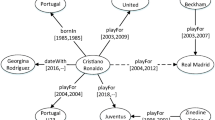Abstract
The task of inferring missing facts using the temporal knowledge graph (TKG) is important and has been widely studied. Extrapolation in TKG inference is more challenging because no direct historical facts are available for predicting future events. Previous methods apply recursive embedding learning to solve the extrapolation problem. However, these methods primarily focus on recent historical facts and overlook the potential knowledge hidden in earlier facts. Moreover, the recursive embedding learning process can lead to imprecise knowledge propagation. To address these issues, we propose a memory-triggered decision-making (MTDM) network. It takes advantage of earlier historical facts to establish initial node representations and then updates node representations with recent historical facts. In particular, to enhance the prediction performance and efficiency, we update node representations of each timestamp in parallel using the proposed Res-GCN and then establish temporal correlations among these representations based on the designed control gating unit. To mitigate the issue of imprecise knowledge propagation, we leverage the facts most relevant to the missing knowledge to directly make predictions. This strategy improves the predictions by focusing on the most informative and contextual-free information. Additionally, we introduce the dissolution constraint, which enables us to analyse the process of event dissolution. Extensive experiments demonstrate that MTDM outperforms existing methods in terms of prediction accuracy and computational efficiency.







Similar content being viewed by others
Data Availability
All data generated or analyzed during this study are included in this published article [and its supplementary information files].
Code Availability
The code has been published on https://github.com/Dlut-lab-zmn/MTDM.
References
Jiao S, Zhu Z, Wu W, Zuo Z, Qi J, Wang W, Zhang G, Liu P (2022) An improving reasoning network for complex question answering over temporal knowledge graphs. Applied Intelligence, pp 1–14
Leblay J, Chekol MW (2018) Deriving validity time in knowledge graph. In: The The Web Conference
Jia Z, Abujabal A, Saha Roy R, Strötgen J, Weikum G (2018) Tequila: Temporal question answering over knowledge bases. In: ACM International conference on information and knowledge management
Cao X, Liu Y (2022) Relmkg: reasoning with pre-trained language models and knowledge graphs for complex question answering. Applied Intelligence, pp 1–15
Khan N, Ma Z, Yan L, Ullah A (2022) Hashing-based semantic relevance attributed knowledge graph embedding enhancement for deep probabilistic recommendation. Applied Intelligence, pp 1–26
Guo Q, Zhuang F, Qin C, Zhu H, Xie X, Xiong H, He Q (2020) A survey on knowledge graph-based recommender systems. IEEE Trans Knowl Data Eng 34(8):3549–3568
Hsu P-Y, Chen C-T, Chou C, Huang S-H (2022) Explainable mutual fund recommendation system developed based on knowledge graph embeddings. Applied Intelligence, pp 1–26
Ji S, Pan S, Cambria E, Marttinen P, Philip SY (2021) A survey on knowledge graphs: Representation, acquisition, and applications. IEEE Trans Neural Netw Learn Syst 33(2):494–514
Hataya R, Nakayama H, Yoshizoe K (2021) Graph energy-based model for molecular graph generation. In: Energy based models workshop-ICLR
Jin W, Qu M, Jin X, Ren X (2020) Recurrent event network: Autoregressive structure inference over temporal knowledge graphs. In: Conferenceon empirical methods in natural language processing (EMNLP)
Li Zx, Jin X, Li W, Guan S, Guo J, Shen H, Wang Y, Cheng X (2021) Temporal knowledge graph reasoning based on evolutional representation learning. In: ACM International conference on research and development in information retrieval (SIGIR)
Cui H, Peng T, Bao T, Han R, Han J, Liu L (2022) Stepwise relation prediction with dynamic reasoning network for multi-hop knowledge graph question answering. Applied Intelligence, pp 1–15
Shao P, Zhang D, Yang G, Tao J, Che F, Liu T (2022) Tucker decomposition-based temporal knowledge graph completion. Knowl-Based Syst 238:107841
Goel R, Kazemi SM, Brubaker M, Poupart P (2020) Diachronic embedding for temporal knowledge graph completion. In: AAAI Conference on articial intelligence
Tao Y, Li Y, Wu Z (2021) Temporal link prediction via reinforcement learning. In: IEEE International conference on acoustics, speech and signal processing (ICASSP)
Zhu C, Chen M, Fan C, Cheng G, Zhang Y (2021) Learning from history: Modeling temporal knowledge graphs with sequential copy-generation networks. In: AAAI Conference on artificial intelligence
Xue, B., Zou, L.: Knowledge graph quality management: a comprehensive survey. IEEE Transactions on Knowledge and Data Engineering pp 14:1–20 (2022)
Chen X, Jia S, Xiang Y (2020) A review: Knowledge reasoning over knowledge graph. Expert Syst Appl 141:112948
Dettmers T, Minervini P, Stenetorp P, Riedel S (2018) Convolutional 2d knowledge graph embeddings. In: AAAI Conference on artificial intelligence
Khan N, Ma Z, Ullah A, Polat K (2022) Dca-iomt: Knowledge-graphembedding- enhanced deep collaborative alert recommendation against covid-19. IEEE Trans Ind Inform 18(12):8924–8935
Zhong Q, Ding L, Liu J, Du B, Jin H, Tao D (2023) Knowledge graph augmented network towards multiview representation learning for aspectbased sentiment analysis. IEEE Transactions on knowledge and data engineering
Cui Y,Wang Y, Sun Z, Liu W, Jiang Y, Han K, Hu W (2022) Inductive knowledge graph reasoning for multi-batch emerging entities. In: Proceedings of the 31st ACM international conference on information & knowledge management, pp 335–344
Liu H, Zhou S, Chen C, Gao T, Xu J, Shu M (2022) Dynamic knowledge graph reasoning based on deep reinforcement learning. Knowl-Based Syst 241:108235
Chen L, Cui J, Tang X, Qian Y, L Y, Zhang Y (2022) Rlpath: a knowledge graph link prediction method using reinforcement learning based attentive relation path searching and representation learning. Applied Intelligence, pp 1–12
Zha H, Chen Z, Yan X (2022) Inductive relation prediction by bert. Proceedings of the AAAI conference on artificial intelligence 36:5923–5931
Shang C, Tang Y, Huang J, Bi J, He X, Zhou B (2019) End-to-end structure-aware convolutional networks for knowledge base completion. In: AAAI Conference on artificial intelligence
Wang Z, Wang Z, Li X, Yu Z, Guo B, Chen L, Zhou X (2022) Exploring multi-dimension user-item interactions with attentional knowledge graph neural networks for recommendation. IEEE Transactions on Big Data
Liang S, Zhu A, Zhang J, Shao J (2023) Hyper-node relational graph attention network for multi-modal knowledge graph completion. ACM Trans Multimed Comput, Commun Appl 19(2):1–21
Zhao Y, Zhou H, Zhang A, Xie R, Li Q, Zhuang F (2023) Connecting embeddings based on multiplex relational graph attention networks for knowledge graph entity typing. IEEE Trans Knowl Data Eng 35(5):4608–4620. https://doi.org/10.1109/TKDE.2022.3142056
Dasgupta SS, Ray SN, Talukdar P (2018) Hyte: Hyperplane-based temporally aware knowledge graph embedding. In: Conference on empirical methods in natural language processing (EMNLP)
Li Z, Jin X, Guan S, Li W, Guo J, Wang Y, Cheng X (2021) Search from history and reason for future: Two-stage reasoning on temporal knowledge graphs. In: Annual meeting of the association for computational linguistics (ACL)
Han Z, Ma Y, Wang Y, Günnemann S, Tresp V (2020) Graph hawkes neural network for forecasting on temporal knowledge graphs. In: Conference on automated knowledge base construction (AKBC)
Yu M, Guo J, Yu J, Xu T, Zhao M, Liu H, Li X, Yu R (2022) Tbdri: block decomposition based on relational interaction for temporal knowledge graph completion. Applied Intelligence, pp 1–13
Chen Z, Zhao X, Liao J, Li X, Kanoulas E (2022) Temporal knowledge graph question answering via subgraph reasoning. Knowl-Based Syst 251:109134
Zhao Y, Wang X, Chen J, Wang Y, Tang W, He X, Xie H (2022) Timeaware path reasoning on knowledge graph for recommendation. ACM Trans Inform Syst 41(2):1–26
Liu Y, Ma Y, Hildebrandt M, Joblin M, Tresp V (2022) Tlogic: Temporal logical rules for explainable link forecasting on temporal knowledge graphs. In: AAAI Conference on artificial intelligence
Lv X, Han X, Hou L, Li J, Liu Z, Zhang W, Zhang Y, Kong H, Wu S (2020) Dynamic anticipation and completion for multi-hop reasoning over sparse knowledge graph. In: Conference on empirical methods in natural language processing (EMNLP)
Yan C, Zhao F, Jin H (2022) Exkgr: Explainable multi-hop reasoning for evolving knowledge graph. In: Database systems for advanced applications: 27th international conference, DASFAA 2022, Virtual Event, April 11–14:2022, Proceedings, Part I, Springer, pp 153–161
Yuan L, Li Z, Qu J, Zhang T, Liu A, Zhao L, Chen Z (2022) Trhyte: Temporal knowledge graph embedding based on temporal-relational hyperplanes. Database systems for advanced applications. Springer, Cham, pp 137–152
Li Z, Hou Z, Guan S, Jin X, Peng WB, Bai L, Lyu Y, Li W, Guo J, Cheng X (2022) Hismatch: Historical structure matching based temporal knowledge graph reasoning. In: Conference on empirical methods in natural language processing
Schlichtkrull M, Kipf TN, Bloem P, Van Den Berg R, Titov I, Welling M (2018) Modeling relational data with graph convolutional networks. In: European semantic web conference
Malaviya C, Bhagavatula C, Bosselut A, Choi Y (2020) Commonsense knowledge base completion with structural and semantic context. In: AAAI Conference on artificial intelligence
Vashishth S, Sanyal S, Nitin V, Agrawal N, Talukdar P (2020) Interacte: Improving convolution-based knowledge graph embeddings by increasing feature interactions. In: AAAI Conference on artificial intelligence
Trivedi R, Dai H, Wang Y, Song L (2017) Know-evolve: Deep temporal reasoning for dynamic knowledge graphs. In: International conference on machine learning (ICLR), pp 3462–3471
Mahdisoltani F, Biega J, Suchanek F (2014) Yago3: A knowledge base from multilingual wikipedias. In: 7th Biennial conference on innovative data systems research
Sun H, Zhong J, Ma Y, Han Z, He K (2021) Timetraveler: Reinforcement learning for temporal knowledge graph forecasting. In: Conference on empirical methods in natural language processing (EMNLP)
Wang Z, Ding D, Ren M, Conti M (2021) Tango: A temporal spatial dynamic graph model for event prediction. Neurocomputing
García-Durán A, Dumančić S, Niepert M (2018) Learning sequence encoders for temporal knowledge graph completion. In: Conferenceon empirical methods in natural language processing (EMNLP)
Lacroix T, Obozinski G, Usunier N (2020) Tensor decompositions for temporal knowledge base completion. International conference on learning representations (ICLR)
Han Z, Chen P, Ma Y, Tresp V (2020) Explainable subgraph reasoning for forecasting on temporal knowledge graphs. In: International conference on learning representations (ICLR)
Leetaru K, Schrodt PA (2013) Gdelt: Global data on events, location, and tone, 1979–2012. ISA Annual convention 2:1–49
Jia Z, Pramanik S, Saha Roy R, Weikum G (2021) Complex temporal question answering on knowledge graphs. In: Proceedings of the 30th ACM international conference on information & knowledge management, pp 792–802
Jiao S, Zhu Z, Wu W, Zuo Z, Qi J, Wang W, Zhang G, Liu P (2023) An improving reasoning network for complex question answering over temporal knowledge graphs. Appl Intell 53(7):8195–8208
Deng S, Rangwala H, Ning Y (2020) Dynamic knowledge graph based multi-event forecasting. In: Proceedings of the 26th ACM SIGKDD international conference on knowledge discovery & data mining, pp 1585–1595
Feng F, He X, Wang X, Luo C, Liu Y, Chua T-S (2019) Temporal relational ranking for stock prediction. ACM Trans Inform Syst (TOIS) 37(2):1–30
Funding
This work is supported by the Ministry of Science and Technology of the People’s Republic of China (No. 2018AAA0102003), the Fundamental Research Funds for the Central Universities (No. 82232006, No. DUT22JC06), and the National Natural Science Foundation of China (No. 61902053).
Author information
Authors and Affiliations
Contributions
Conceptualization, M.Z. and L.Z.; methodology, M.Z. and L.Z. ; validation, M.Z. and Y.K.; formal analysis, M.Z. and Y.K.; investigation, M.Z.; resources, B.Y.; data curation, M.Z.; writing-original draft preparation, M.Z.; writing-review and editing, L.Z., Y.K., B.Y.; visualization, M.Z.; supervision, B.Y.; project administration, B.Y.; All authors have read and agreed to the published version of the manuscript.
Corresponding author
Ethics declarations
Conflict of Interests
The authors declare no conflict of interest.
Additional information
Publisher's Note
Springer Nature remains neutral with regard to jurisdictional claims in published maps and institutional affiliations.
Rights and permissions
Springer Nature or its licensor (e.g. a society or other partner) holds exclusive rights to this article under a publishing agreement with the author(s) or other rightsholder(s); author self-archiving of the accepted manuscript version of this article is solely governed by the terms of such publishing agreement and applicable law.
About this article
Cite this article
Zhao, M., Zhang, L., Kong, Y. et al. Temporal knowledge graph reasoning triggered by memories. Appl Intell 53, 28418–28433 (2023). https://doi.org/10.1007/s10489-023-05015-3
Accepted:
Published:
Issue Date:
DOI: https://doi.org/10.1007/s10489-023-05015-3




